Social Media Tune Up: Twitter Part 4, Hashtags

In my update last week on the Social Media Tune Up series, I promised another in the sub-series on Twitter, to look at hashtags (#) and lists.
 Hashtags and lists are features of using Twitter which help explain to the interested enquirer why there is far more to Twitter and Twitterville than people sharing breakfast experiences. And why any serious social media strategy for business will almost certainly include provision for the business in question to have a presence of some kind on Twitter.
Hashtags and lists are features of using Twitter which help explain to the interested enquirer why there is far more to Twitter and Twitterville than people sharing breakfast experiences. And why any serious social media strategy for business will almost certainly include provision for the business in question to have a presence of some kind on Twitter.
But rather than trying to cover both items, hashtags and lists, in the one post I’ve decided it makes more sense to do two separate posts, this one to be on hashtags and one to follow on lists.
What are hashtags?
The simple hashtag functions with fascinating efficiency as an organizing and navigational tool for Twitter users, along with the @ symbol, used to tag account holders, mainly people (mine is @deswalsh) and companies or organizations (Social Media Club Gold Coast is @smcgc).
At the simplest level, a Twitter hashtag is a word preceded by the # (hash or pound) sign. The “word” can be two or more words run together, such “blog + chat” as #blogchat, used to point most notably to a weekly live Twitter chat session about blogging, hosted by @MackCollier.
The hashtag allows any number of “tweets” about a topic or an event to be grouped together.
It can be used for an event, not just on Twitter and not even just online. @MariSmith in her excellent video on hashtags gives the example #asw09 for the event she was attending at the time, the Affiliate Marketing Summit 2009.
It is quite common now for conferences, especially those which have a social media emphasis, to have a conference hashtag and even for individual sessions to have their own hashtags. It’s also not unusual at such events to have a screen at the front of the room dedicated to showing the “tweetstream” with the session hashtag. That practice raises a whole other discussion about how the presenter or presenters handle that kind of live interaction: a subject for another post.
How do I find a hashtag stream?
It’s not difficult to find a hashtag stream. Here are some basic ways:
a) Go to search.twitter.com and insert the hashtag you want in the search box
In this example, I searched on #blogchat. Note that although this week’s #blogchat event had ended formally some nine hours previously, there were quite fresh tweets: that illustrates the fact that no one controls how often or with what frequency a hashtag is used.
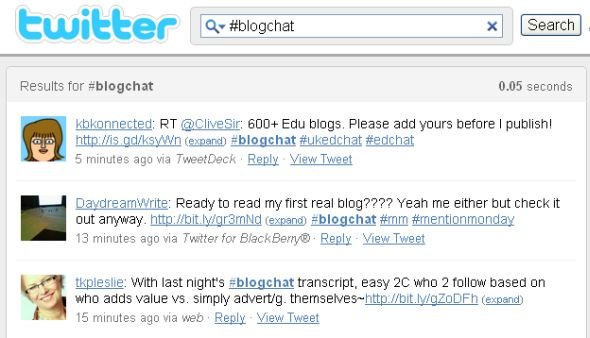
b) Use a service like Tweetchat to list a hashtag stream
Again I’ve used #blogchat to illustrate. Note that, as in this instance I signed in to my free Tweetchat account it provides a field for me to add directly to the hashtag stream if I so choose. Because it is a dedicated service, I don’t need to add the hashtag: in fact, if I do the tweet will show up with the #blogchat hashtag twice. This means a service like Tweetchat can help me participate more efficiently in a tweet chat session. I can also use Tweetchat without signing in: it will then just provide the chat stream, without the field enabling me to participate directly from Tweetchat.
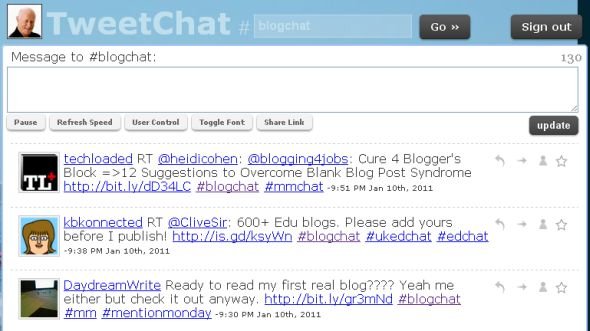
Another service mentioned by Mari Smith in the video linked above, is Twemes.
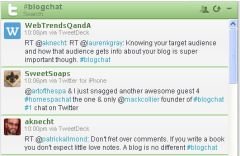 c) Use a dashboard service like Hootsuite, Tweetdeck or Seesmic
c) Use a dashboard service like Hootsuite, Tweetdeck or Seesmic
In Hootsuite, for example, I clicked on the + Add Stream tab in the menu bar at the top of the screen, entered the #blogchat and a new column was added, dedicated to the #blogchat stream.
Managing a hashtag chat
 What the Hashtag? is a very useful tool for managing a hashtag chat. You register your hashtag-referenced event and What the Hashtag provides supporting documentation. As the screenshot shows, this includes a graph and specific statistics of participation, a transcript (very handy for participants and people who were not available at the time), an ordered list of those who tweeted most during the session.
What the Hashtag? is a very useful tool for managing a hashtag chat. You register your hashtag-referenced event and What the Hashtag provides supporting documentation. As the screenshot shows, this includes a graph and specific statistics of participation, a transcript (very handy for participants and people who were not available at the time), an ordered list of those who tweeted most during the session.
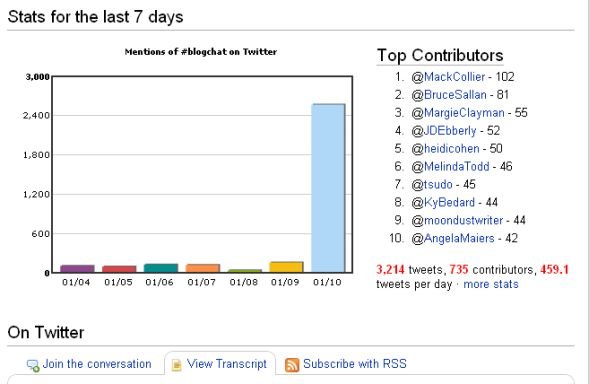
Roll your own
You can make your own hashtag, whether for an event or for a topic of discussion.
For example, the other day I tweeted about the bizarre experience of seeing hot cross buns, traditionally associated with Easter, appearing in our local supermarket just two weeks after Christmas Day. I used the hashtag #whatpricetradition. So far only two other people have used it, but who knows, someone may tweet about some other departure from tradition and use the hashtag. I don’t own it and it may well never be used again.
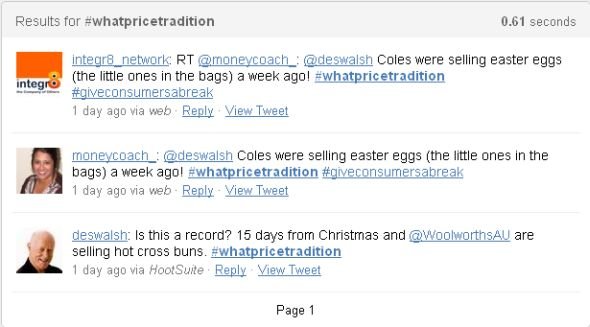
Although you can “make your own” hashtag, as I say it’s not really your own.
Accordingly, as you have no exclusive right to a hashtag, don’t be surprised if you get tweets appearing which have no real connection with the topic or event. Spammers will also intrude from time to time: by using the hashtag they get their spammy messages into the hashtag stream. Often in a discussion some one or more people will make it very clear to the spammers that they and their spammy messages are unwelcome.
It’s not all about branding and marketing
I found this morning an interesting example of using hashtags creatively, outside the branding and marketing fields which seem to dominate a lot of discussion about social media. It was from the education field and illustrates a way for hashtags to be used to help teachers do their job more efficiently and effectively.
Thirty hashtags are listed, in the post Top Twitter Hashtags for Teachers, on the UK-based Creative Education Blog, with an invitation to readers to add more.
Summing up
Hashtags are a very handy tool for curating discussions and helping with the organization of, promotion for and management of events and for follow up after the event.
If you have any examples of how hashtags have helped your business or career, or helped you build connections or learn new things, please share with us in the comments.
Image credit: “Hashtags” by halfbrown, via Flickr, Creative Commons
Des Walsh
Business coach and digital entrepreneur. With coach training from Coachville.com and its Graduate School of Coaching, and a founding member of the International Association of Coaching, Des has been coaching business owners and entrepreneurs for the past 20 years. Over the same period he has also been actively engaged in promoting the business opportunities of the digital economy. He is a certified Neurolinguistic Programming (NLP) coach, and a certified specialist in social media strategy and affiliate marketing.

Superb article. Hashtags make Twitter what it is, in my honest opinion. I do love a good trending topic.